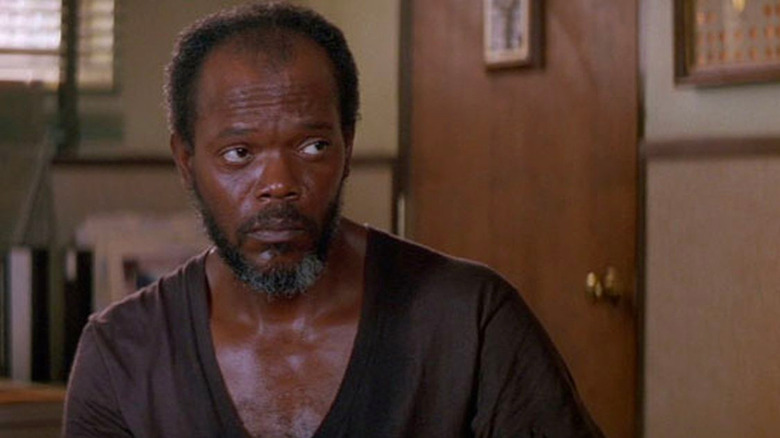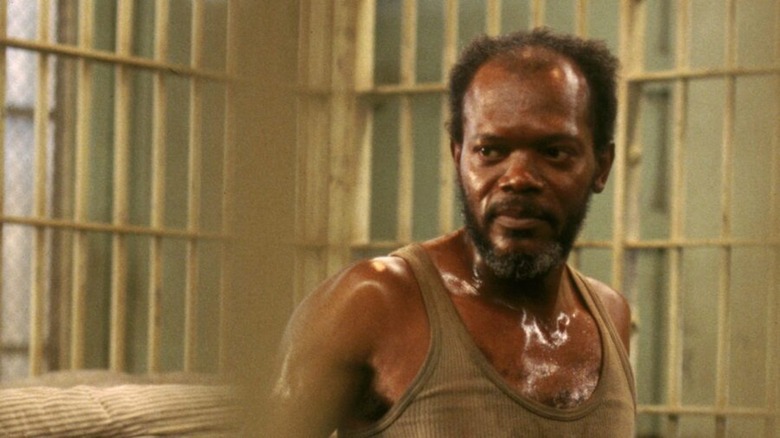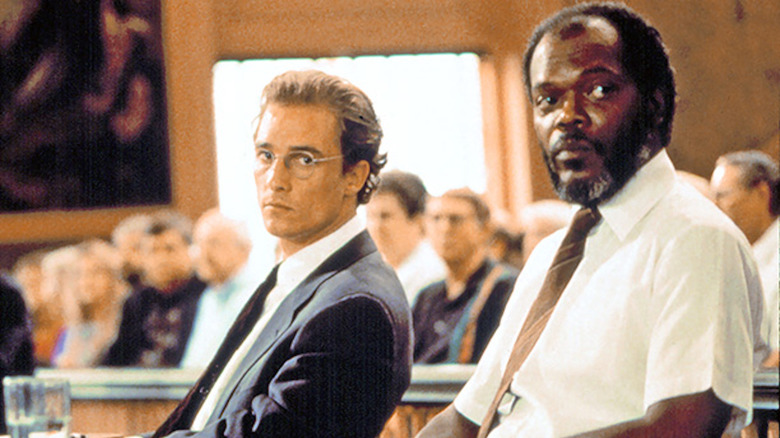Samuel L. Jackson Sounds Off On A Time To Kill Cutting An Oscar-Worthy Scene
For a time in the 1990s, a film adaptation of a John Grisham novel was guaranteed to turn a tidy profit at the box office, if not mushroom into a full-on blockbuster. "The Firm," "The Pelican Brief" and "The Client" all made loads of money off of a built-in audience that just had to see how the lawyer-turned-bestselling author's latest book was brought to life by Hollywood's biggest stars. Tom Cruise, Gene Hackman, Denzel Washington, Julia Roberts, Tommy Lee Jones, and Susan Sarandon, among many others, were enlisted to turn these page-turners into big-screen spectacles. They were never better than over-produced B movies, but you didn't care because the material was never more than risible. Grisham wrote disposable legal thrillers that moved fast enough to get you past their myriad implausibilities, and there was nothing wrong with this.
"A Time to Kill" was a different animal. Based on Grisham's debut novel, it's basically "To Kill a Mockingbird" crossed with "Death Wish." Samuel L. Jackson stars as Carl Lee Hailey, a Mississippi father whose 10-year-old daughter is raped, beaten, and nearly hanged to death by two white men. When he realizes these men will likely go free, Hailey takes an automatic rifle to the courthouse and publicly executes the assailants in full view of multiple witnesses.
Because this is Mississippi, Hailey is doomed. The politically ambitious DA (Kevin Spacey) has been gift-wrapped an open-and-shut conviction that will make him a hero to the majority of white Southerners. Only a young, conscience-stricken defense attorney (Matthew McConaughey) can spare Hailey the electric chair. A courtroom drama is in the offing, but who is the hero of the piece: the white guy who's got to convince his people they'd do likewise if the victim were white, or the wrathful Black father who refused to let rigged justice run its course?
Director Joel Schumacher made his decision, and it might've cost Jackson an Oscar.
A performance allegedly defanged in the editing room
In a wide-ranging, must-read interview with Vulture's Bilge Ebiri, Jackson, who, despite being one of our greatest living actors, has never won a competitive Oscar (he received an honorary Academy Award in 2022), revealed that the filmmakers turned Hailey into a more calculating killer to, presumably, heighten the dramatic stakes. In doing so, they travestied his character's righteous motivation. As Jackson told Ebiri:
"In 'A Time to Kill,' when I kill those guys, I kill them because my daughter needs to know that those guys are not on the planet anymore and they will never hurt her again — that I will do anything to protect her. That's how I played that character throughout. And there were specific things we shot, things I did to make sure that she understood that, but in the editing process, they got taken out. And it looked like I killed those dudes and then planned every move to make sure that I was going to get away with it. When I saw it, I was sitting there like, 'What the f***?'"
Jackson went on to state, in his wonderfully blunt fashion, "The things they took out kept me from getting an Oscar. Really, motherf***ers? You just took that s*** from me?" This included a monologue that, when he performed it on set, left everyone in tears. Why did they cut this scene? "Because it wasn't my movie," he said. "[T]hey weren't trying to make me a star."
Sadly, A Time to Kill might be more relevant today
There's been no response from the producers or screenwriter Akiva Goldsman (Schumacher is permanently unavailable for comment), but Hollywood was deeply invested in making McConaughey a star after his breakout performance in Richard Linklater's "Dazed and Confused." The following year, he played Jodie Foster's love interest in Robert Zemeckis' "Contact" and top-lined Steven Spielberg's "Amistad" (where, this time, he played a principled lawyer trying to clear slaves of clearly justified murder). He's since won a Best Actor Oscar (for 2013's "Dallas Buyers Club"), while Jackson hasn't earned a nomination since "Pulp Fiction" in 1994 (which was a supporting nod because Miramax's Harvey Weinstein wanted to push John Travolta for Actor that year).
This does Jackson no good, but I wonder how "A Time to Kill" would be handled in 2023. Now that hate crimes are on the rise in the United States, states like Florida are seeking to teach the beneficial aspects of slavery and a virulently racist ditty is one of the most popular songs in the country, perhaps a drama depicting a father avenging the rape and attempted murder of his 10-year-old child at the hands of white bigots would tilt a tad more in the father's favor. While it's a relief that the murderers of George Floyd and Ahmaud Arbery were convicted, this nonsense shouldn't happen in a supposedly civilized nation. But here we are. So if, hypothetically, two monsters scar your child for life, maybe the Paul Kersey response (which, ironically, was pure, racially-motivated fear-mongering in "Death Wish") is worthy of a more focused dramatic inquiry.
Because a guilty verdict doesn't undo a life of unshakable trauma. It's an awful thing to consider, but art holds up the mirror to nature. And our nature is plug-ugly right now.


